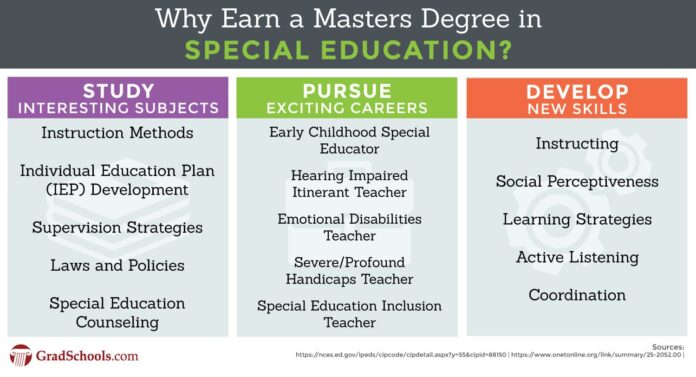Masters in Special Education: Empowering Educators to Make a Difference
1. Understanding Special Education
Special education is a specialized field of education that focuses on meeting the unique needs of students with disabilities. These disabilities can range from physical, mental, emotional, or developmental impairments that require tailored instruction and support.
Importance of Special Education
Special education plays a crucial role in ensuring that students with disabilities receive the necessary accommodations and interventions to help them succeed academically and socially. By providing individualized education plans (IEPs) and specialized teaching strategies, special education teachers empower students to reach their full potential.
2. Benefits of Pursuing a Masters in Special Education
A master’s degree in special education equips educators with advanced knowledge and skills to effectively support students with disabilities. The program typically covers topics such as inclusive education practices, behavioral interventions, assistive technology, and legal considerations in special education.
Career Advancement
Graduates with a master’s in special education are highly sought after in schools and educational institutions. They may qualify for leadership positions such as special education coordinators, behavior specialists, or program directors. Additionally, a master’s degree can lead to higher salaries and increased job opportunities.
3. Curriculum and Coursework
A master’s in special education program typically includes courses such as assessment and evaluation of students with disabilities, instructional strategies for diverse learners, collaboration with families and professionals, and legal and ethical issues in special education. Students may also complete a supervised practicum or internship to gain hands-on experience in the field.
Specialized Tracks
Some programs offer specialized tracks or concentrations in areas like autism spectrum disorders, learning disabilities, or emotional and behavioral disorders. These tracks allow students to deepen their knowledge and skills in a specific area of special education and tailor their education to their career goals.
4. Admission Requirements
Admission requirements for a master’s in special education program may vary depending on the institution. Typically, applicants are required to hold a bachelor’s degree in education or a related field, submit letters of recommendation, a statement of purpose, and transcripts. Some programs may also require GRE scores or a teaching license.
Prerequisites
Prior experience working with students with disabilities or in the field of special education is often preferred. Strong communication skills, empathy, and a passion for advocating for students with disabilities are also important qualities for prospective students in a master’s in special education program.
5. Online vs. On-Campus Programs
Many universities offer both online and on-campus options for earning a master’s in special education. Online programs provide flexibility for working professionals or those with busy schedules, while on-campus programs may offer more hands-on experiences and networking opportunities.
Choosing the Right Format
When deciding between an online or on-campus program, consider your learning style, schedule, and goals. Online programs are convenient and accessible, while on-campus programs allow for face-to-face interactions with professors and peers. Choose the format that best suits your needs and preferences.
6. Funding and Financial Aid
Pursuing a master’s degree in special education can be a significant financial investment. However, there are several funding options available to help offset the cost. Many students utilize scholarships, grants, fellowships, or student loans to finance their education.
Scholarship Opportunities
Some organizations, foundations, and government agencies offer scholarships specifically for students pursuing a degree in special education. Research scholarship opportunities early and apply to as many as possible to maximize your chances of receiving financial assistance for your master’s program.
7. Career Opportunities in Special Education
Graduates with a master’s in special education have a wide range of career opportunities in various educational settings. They may work as special education teachers, behavior analysts, educational diagnosticians, or instructional coordinators. The demand for qualified special education professionals continues to grow.
Job Outlook
According to the Bureau of Labor Statistics, employment of special education teachers is projected to grow 8% from 2016 to 2026, which is about as fast as the average for all occupations. This growth is driven by increasing awareness of the importance of early intervention for students with disabilities.
8. Networking and Professional Development
Building a strong professional network is essential for career growth in the field of special education. Joining professional organizations, attending conferences, and participating in workshops can help you stay current on best practices, trends, and research in special education.
Professional Associations
Consider joining organizations like the Council for Exceptional Children (CEC), the Learning Disabilities Association of America (LDA), or the National Association of Special Education Teachers (NASET) for networking opportunities, resources, and professional development in the field of special education.
9. Impact on Students and Communities
Special education professionals play a vital role in improving the lives of students with disabilities and their families. By providing individualized support, advocacy, and inclusive education practices, they help students thrive academically, socially, and emotionally, leading to a more inclusive and equitable society.
Creating Positive Change
The impact of special education professionals extends beyond the classroom and into communities, where they work to promote acceptance, understanding, and accessibility for individuals with disabilities. Their dedication and commitment make a lasting difference in the lives of students and contribute to a more inclusive society.
10. Conclusion
Pursuing a master’s degree in special education is a rewarding and impactful decision for educators who are passionate about making a difference in the lives of students with disabilities. By gaining advanced knowledge, skills, and experience, graduates are equipped to lead inclusive classrooms, advocate for positive change, and empower students to reach their full potential.


